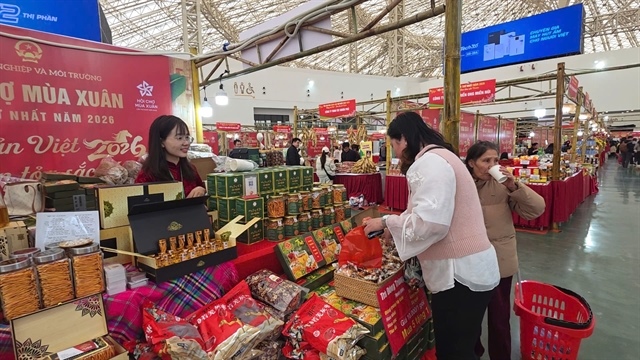Department stores ‘outshone’ by shopping malls in Vietnam
Department stores ‘outshone’ by shopping malls in Vietnam
Mall operators have found a way for their shopping centers to win in Vietnam while several department stores are disappearing in the Southeast Asian country.

Shopping malls and department stores are two different types of shopping venues but are often confused as many people believe them to be the same thing.
A shopping mall is a unit made up of one or multiple buildings that house various different shops while a department store is a retail establishment that is situated in one building or a mall that sells a variety of goods or products to satisfy customer’s needs.
Malls are greater in compared to department stores and generally house multiple department stores.
Particularly, Parkson and Diamond Plaza are among the prominent names representing department stores while Vincom Center and Pico Plaza are common shopping malls in Vietnam.
Is Parkson ‘dying’?
The consecutive store shutdowns of Parkson in Ho Chi Minh City substantiate a situation where department stores are really having a hard time in Vietnam.
Parkson is a member of The Lion Group, the Malaysian international conglomerate operating a network of 124 department stores across Malaysia, China, Vietnam, Indonesia, Myanmar and Cambodia.
The next department store in line for this closing-down saga will likely be Parkson Cantavil.
Although Parkson has yet to announce the closure of the department store at the Cantavil Premier Building in District 2’s An Phu Ward, people have cast a doubt on it as the signboard was taken down.
The vendors said that they are currently working directly with Cantavil Premier building’s operator and being responsible for their businesses by themselves instead.
According to a real estate consulting company, Parkson is completing procedures to withdraw from the Cantavil venue.
If this information is correct, only three Parkson’s department stores, located at Hung Vuong Plaza in District 5, Saigon Tourist Plaza in District 1 and CT Plaza in Tan Binh District, will remain in operation in Ho Chi Minh City.
Previously, the Malaysian retail leaseholder in turn closed four other department stores in both the southern metropolis and Hanoi.
According to a financial report by Parkson Retail Asia, Vietnam is the chain’s most ineffective market as it saw the seventh consecutive quarter of loss in the Southeast Asian country by the end of Q1-2018.
Not only in Vietnam, Parkson’s revenue also slumped in Malaysia, Indonesia and Myanmar.
Parkson Holdings Berhad (PHB), an investment holding company with stakes in Parkson Retail Asia (PRA) and Parkson Retail Group Limited (PGRL), reported losses of MYR113 million (US$27.16 million) in 2017 and MYR162 million ($38.94 million) in 2016, according to auditor Ernst & Young (E&Y).
It had to discontinue seven different department stores in Malaysia and Indonesia in the 2017-2018 fiscal year.
According to Business Studies and Assistance Center (BSA)'s retail training specialist Pham Trong Chinh, Parkson's demise was anticipated even before that as it was incompetent in the three areas of shopping space, dining space and entertainment space.
Retail analysts warned that Parkson may continue to have to close more Parkson department stores if it fails to think of new strategies and changes.
Change or die
According to statistics by the specialized real estate services and investment management firm Jones Lang LaSalle (JLL), the retail model of department stores modestly occupies 101,877 square meters, while shopping malls p over 880,646 square meters in Ho Chi Minh City.
The shopping malls provide food courts, amusement areas, cinemas, spaces for photography with many different products at various prices, in many segments, from both domestic and international brands.
In the meantime, Parkson has been consistently keen on department stores, offering high-end products and aiming at high-income consumers only.
This makes Parkson's model obsolete, as HSBC predicts that Vietnam will have 33 million people in the middle class, which will be the main shoppers in the country by 2020.
Not only Parkson, other retail leaseholders that follow the department store model such as Grand Plaza in Hanoi, Hang Da Galleria, and Thien Son Plaza in Ho Chi Minh City are also having a hard time.
Some quietly withdrew from the market while some other players such as Trang Tien Plaza, Diamond Plaza managed to stand still thanks to restructuring.
For instance, Diamond Plaza was upgraded to spare four more stories for a full range of shopping, dining, entertainment, supermarket, spa, bowling and household items after 12 years of operation in the same concept as Parkson from 2000 to 2012.
Saigon Center, after a period of temporary closure, transformed and reappeared with a new face in 2016.
Thuan Kieu Plaza, after repair and upgrading, also ‘revived’ under the name Grand Mall as a shopping complex with full services of shopping, food, culture and entertainment in November 2017.
Zen Plaza also turned for office space and increased an area for food business.
According to JLL, shopping mall is the type of business that has the most positive results and most investment in the retail market in Ho Chi Minh City in particular and in Vietnam in general.
Catching up with this trend, the leading local retailer Saigon Co.op, which currently focuses on supermarkets, “is also researching and upgrading some supermarkets with large acreages into shopping centers that will combine shopping and entertainment businesses,” according to its marketing director Do Quoc Huy.
However, JLL also forewarn in its report that traditional retail models may continue to face more challenges in the future, especially under pressure from the development of e-commerce.
JLL thus advised retailers to focus more on creating new shopping experiences, creating places for cultural and entertainment experience and art display, instead of simply serving shopping purpose.



















